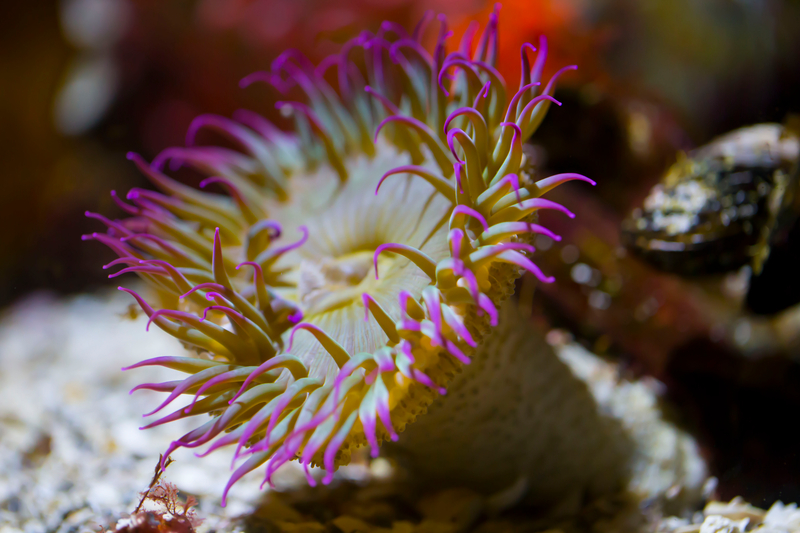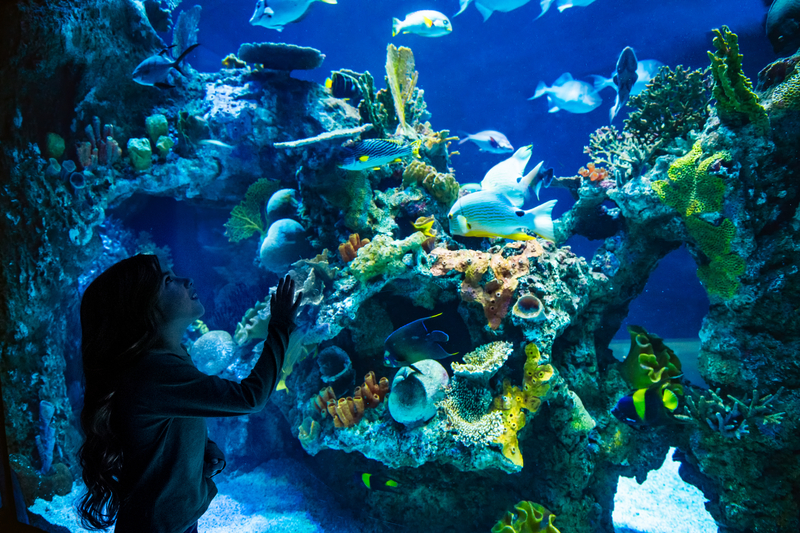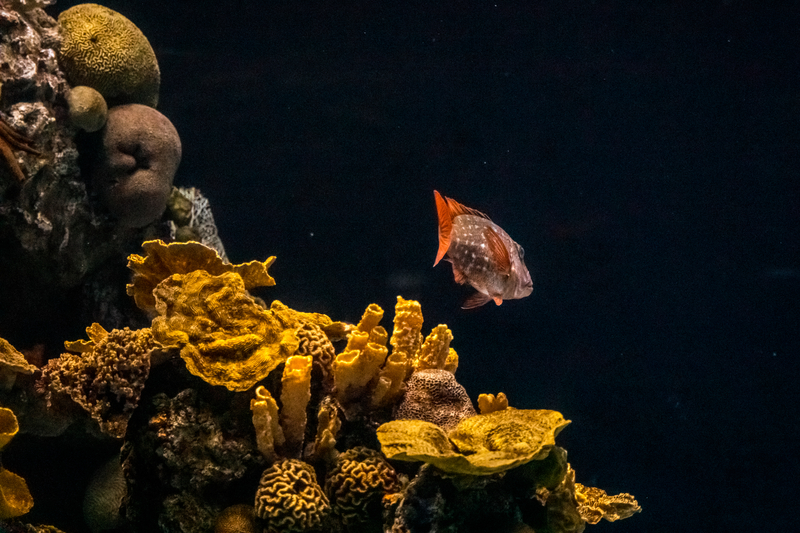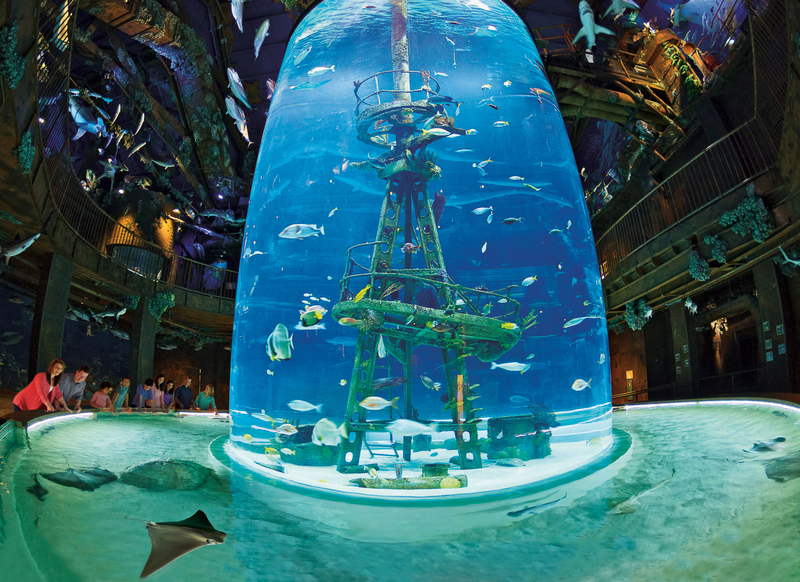Cities of the Ocean: The Importance of Protecting Coral Reefs

Published June 13, 2024
Coral reefs make up the vast and lively urban centers of the ocean. They play a crucial role in supporting 25% of all ocean life as they provide food, shelter, and breeding grounds for various marine species. Corals are classified as animals, and they range in size, color, and shape. They possess the incredible ability to grow and divide to form vast colonies that decorate the ocean floor. These colonies can take hundreds to thousands of years to grow and expand, reaching sizes of a car or house.
Even though corals are the structures that hold up marine civilizations, they are not indestructible. Since the 1980s, biologists have been concerned with the phenomenon of ‘coral bleaching’ – the result of ocean acidification. The concentration of carbon dioxide (CO2) in the atmosphere affects ocean temperatures. The ocean absorbs about 30% of CO2 released into the atmosphere. An increase in absorption has impacted typical pH levels of seawater, unleashing a handful of issues that impacts marine life.

Chemistry Lesson: the pH scale runs from 0 to 14, with seven being neutral. Anything higher than seven is basic (alkaline) and anything lower than seven is acidic. Since seawater can become more acidic due to the absorption of CO2, the phenomenon of coral bleaching continues to affect reefs in the Atlantic, Pacific, and Indian Ocean basins.
Coral bleaching can lead to death, but these animals are resilient and are able to recover. Recovering from bleaching requires water temperature and pH conditions to improve. Even if corals recover, it can take years for ecosystems to fully heal from the repercussions of this disruption. The National Oceanic and Atmospheric Administration (NOAA) has declared the world is experiencing its fourth global bleaching event on record with the first occurring in 1998. NOAA works with several partners in Florida, Puerto Rico, and the U.S. Virgin Islands to maintain 27 coral nurseries.
Coral nurseries are the result of many conservationists realizing intervention is crucial to give corals a promising future and ensure our oceans remain full of life. Not only are coral nurseries helping to restore these animals, but restoration is needed due to ship groundings and frequent, more aggressive storms that occur because of warmer water temperatures.
Ship groundings are traumatic to coral colonies. They can be intentional like when ships beach to land cargo or a crew. They can also be unintentional like a marine accident which causes a ship to make contact with the seabed.
Storms can impacts coral reefs significantly. The constant, repetitive impact from powerful waves can crush, break, scatter, and flatten corals. Tropical storms like cyclones have impacted the Great Barrier Reef in previous years and can cause damage up to 620 miles from their direct path. As horrific as these storms can be, they don’t always wipe out corals. They can positively affect reefs. As hurricanes pass over warm water, they bring the temperature down which helps to counter the effects of coral bleaching.
Without these architecturally sturdy colonies, our coastlines are at risk of even more damage. Healthy reefs can absorb up to 97% of a wave’s energy. Coral farmers help nurture and grow corals within nurseries and once they are ready, they can be reunited with other wild colonies scattered along the ocean floor. Without these nurseries, our damaged reefs would experience the stresses of trying to rebuild entire ecosystems on their own. Nurseries ensure reefs can grow and thrive more quickly without waiting decades to be restored.

Our Life Sciences team is proud to support reefs worldwide. Past our lower level Out to Sea exhibit, where our sharks and grouper reside, is our three-part coral exhibit. The corals decorating the tanks are the result of passion and dedication since 2015. They may look like separate tanks, but this setup is connected and shares the same water and filtration system.
Over the years, our aquarists have clipped pieces from the corals to grow and nurture new colonies (this process is known as “fragging”). When left unattended, corals in tanks can outgrow their space and begin obstructing surrounding colonies. Fragging keeps stress levels of these animals low and offers specimens to other aqua culture facilities which can be used for coral farming.
Corals grown in captivity are typically genetically different from wild colonies and can provide new genetic material for coral spawning. This research has helped conservationists and biologists better understand restoration practices and conservation efforts.

Wonders of Wildlife’s founder, Johnny Morris, intentionally sunk a 237-foot vessel off the coast of Fort Lauderdale, Florida in 1996. The sunken man-made ship is known as the Offshore Angler. It serves as an artificial habitat for oceanic species and as a symbol for how humans can have a positive impact on nature.
Our Shipwreck Reef exhibit displays how man-made objects can benefit different fish species. You can observe how the fish interact with various items and understand the importance of human intervention when it comes to protecting marine species and their way of life.

As corals are being grown and reestablished, artificial reefs are an ongoing project with a mission to help supply marine life with the necessary means to thrive, giving them access to food sources, shelter, and breeding grounds. The mission of coral conservation is not just for biologists and conservationists – we all live downstream and you can do your part to help protect corals now and in the future!
When visiting coral reefs and coastlines:
- Practice safe and responsible diving and snorkeling
- Use reef-friendly sunscreen
Everyday practices:
- Recycle and properly dispose of trash
- Minimize fertilizer use
- Use environmentally friendly modes of transportation when able (walking, biking, public transportation)
- Reduce stormwater runoff
- Save energy at home and work by unplugging small appliances/electronics and turning off lights
- Spread the word! Educate others about coral reefs and the actions they can take to help protect and promote healthy coral reef ecosystems.
News & Updates
Read the latest news & updates about Wonders of Wildlife.
Recent News & Stories
- Celebrate Native American Heritage Month These Four Ways at Wonders of Wildlife
- Antlers vs. Horns: Key Differences in Nature’s Headgear
- Invaders of the Sea: Lionfish
- Behind the Scenes: Highlighting Our Keepers’ Hard Work
- Shark & Ray Awareness Day: Heroes of the Sea
- Seven “JAWS”ome Souvenirs to Celebrate Shark Week!
- The Largemouth Bass – America’s Most Beloved Fish
